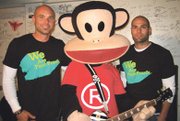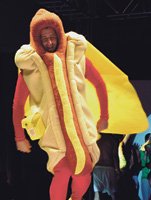Paul Frank Executives Respond
After weeks of keeping relatively mum, executives at the embattled Paul Frank Industries (PFI) have broken their silence to tell their side of the story.
“We had wished and hoped and prayed that it would have never gone as far and as public as it has,” said Ryan Heuser, president and co-founder of the Costa Mesa, Calif.–based manufacturer.
Last month, Paul Frank Sunich, the former creative director and co-founder of PFI, filed two lawsuits calling for dissolution of the company and charging copyright infringement for PFI’s Julius the Monkey character that appears on many of the company’s products. Sunich created Julius in 1995 and partnered with Heuser and John Oswald to incorporate the company as Paul Frank Industries. The lawsuits have garnered quite a bit of media attention and the typically introverted Sunich has made himself available to the press.
The remaining PFI executives, however, took a different tack.
“We’ve really chosen to be very sparing in the comments that we’ve made thus far in hopes of a quick resolution,” Heuser said, but added, “We felt after the continuous articles and inaccuracies presented within those articles that we needed to at least give our side of the story.”
In particular, Heuser and Oswald say Sunich’s claim that he was fired is untrue—at least partially.
According to Oswald, at an Aug. 2 board meeting, “Paul said he wanted to resign and be bought out. He said, ’I don’t want to be part of this anymore,’ and his words were ’I just want to work at Home Depot.’”
The problem arose when Sunich was unsatisfied with the compensation dictated by the shareholder agreement the three founders signed in 1999, Oswald and Heuser said. Months of mediation failed to help the partners reach an agreement, and in the meantime Sunich was being compensated despite not working, they continued.
In November, they said, “We got the board together and we decided if we dismiss Paul without cause it invokes the highest evaluation [of his shares] according to the shareholder agreement. So we did that,” Oswald said. Their offer to Sunich for his third of the company is approximately $600,000.
Terry Fahn, Sunich’s spokesperson, denies Sunich ever quit. In its arbitration, PFI says it terminated Sunich.
Sunich has said he alone voted against his dismissal and he noted that Heuser’s father, George Heuser, “and some finance friends” make up the rest of the board. “It’s heavily weighted on Ryan’s sidehellip; and maybe they took advantage of my trust,” he said. “I just want what’s fair—a fair return on my investment.”
PFI declined to name the other board members.
While the amount doesn’t sound like much in exchange for a third of a reportedly $40 million company, Heuser and Oswald insist it’s fair because the shareholder agreement treats them all equally.
“The way the formula worked out, that’s what the number turned out to be. If Ryan had quit, or I had quit, we’d get that same amount. The thing is we don’t want to quit,” Oswald said. Sunich, they said, would only have been satisfied if they sold the company. “But that’s not fair,” Oswald said, for them or for the 130 employees of the company. “You can’t put a value on a company that’s not for sale. The company is not for sale,” Heuser said.
Fahn denies Sunich wanted to sell the company. “They didn’t have to sell the company to give Paul a fair settlement. People buy out shareholders all the time without selling a company,” he said. In August, Inc. magazine valued the company at $100 million.
Less than friendly
The split, they said, was years in the making. In 2001 or 2002, Sunich moved his workspace into a 3,000-square-foot offsite warehouse.
“We make over 400 line items four times a year and when the creative director is in an offsite location, to the best of our knowledge, it’s very difficult to conduct daily business and make decisions and operate effectively within the calendar year,” Heuser said.
“Sticking to a design calendar is a daily responsibility. Obviously, with him offsite it made that virtually impossible.”
Still, they said they had remained hopeful that Sunich’s workshop would inspire him to create. “Unfortunately, he continued to withdraw to the point of non-participation,” Heuser said.
Sunich contends Heuser and Oswald haven’t given him enough credit for his contributions to the company. “It’s a power play. They started to think they were my boss,” he said. “They started to resent the fact I had a studio and didn’t keep the same hours. But I was always working.”
As creative director, Sunich said he designed and approved designs from characters to clothing to store displays, noting he even went so far as to mix the paint for the Paul Frank bicycles by hand. “I don’t think they realize I did that,” he said.
Sunich also resented the company’s attempts to make him a figurehead. “I did way more important stuff than just be the guy signing autographs on Julius posters. I don’t mind being Paul Frank, but I don’t want to look cheap,” he said.
Hurt feelings abound. Sunich describes being suddenly shut out from the company and having his cell phone, company car and workshop being abruptly taken away from him. “They wanted to escort me out of the studio like an employee on probation,” he said. Heuser and Oswald deny Sunich’s claim.
What happened next has been the subject of a suit filed against Sunich by PFI. “I had no money. I had to go look for work to support my wife and myself,” he said. To that end, he met with guitar maker Fender, Target licensor Mossimo and skateboard manufacturer Chocolate. PFI executives said he was violating their copyright on the Paul Frank name by attempting to work under the moniker. Sunich said he was just trying to make a living. An Orange County judge has declined to issue an order preventing Sunich from using his name for the time being.
Who is Paul Frank?
With the public face of the company and the man credited with creating the myriad of lovable characters that send product flying off the shelves gone, PFI is eager to show it has lost none of its signature style.
“We are Paul Frank. Paul Frank is this building, it’s every one of us here, individuals and together. It’s not the person—it’s the sensibility, it’s the culture, it’s the family that we have, and it’s always been that way,” Oswald said.
To help spread this message, PFI executives invited members of the media to visit the company’s headquarters. The move was surprising, following PFI’s tight-lipped position since Sunich’s departure. Equally surprising was the way in which the press was greeted—with a goodie bag complete with a “We are Paul Frank” bracelet and an invitiation to interview any PFI staffer in the building.
On the day California Apparel News visited PFI headquarters, every person in the building, including Oswald’s dog, wore a “We are Paul Frank” T-shirt. According to Heuser, it was an idea generated in-house, as a sign of solidarity and to acknowledge the contributions of the entire team.
“The employees came up with this “We are Paul Frank” campaign to say, tongue-in-cheek, ’Hey, it’s more than just a guy.’ This success is based on individuals, from customer service to design and everything in between that,” he said. As if on cue, a life-size Julius the Monkey interrupted the interview to shake hands and show off his new red T-shirt emblazoned with a giant registered trademark.
The public struggle with Sunich has served to galvanize the staff, Heuser and Oswald said. “We spent so many years growing so fast that we didn’t really take time to mend our house properly. And so now there’s this resurgence of energy and enthusiasm and creativity. Everyone is looking forward to putting this whole thing behind us and just going back to work and doing what we do best,” Heuser said.
For his part, Sunich said he’s also ready to get back to work and leave the legal fighting behind. “I don’t like this stuff. There are so many things I want to do.”























